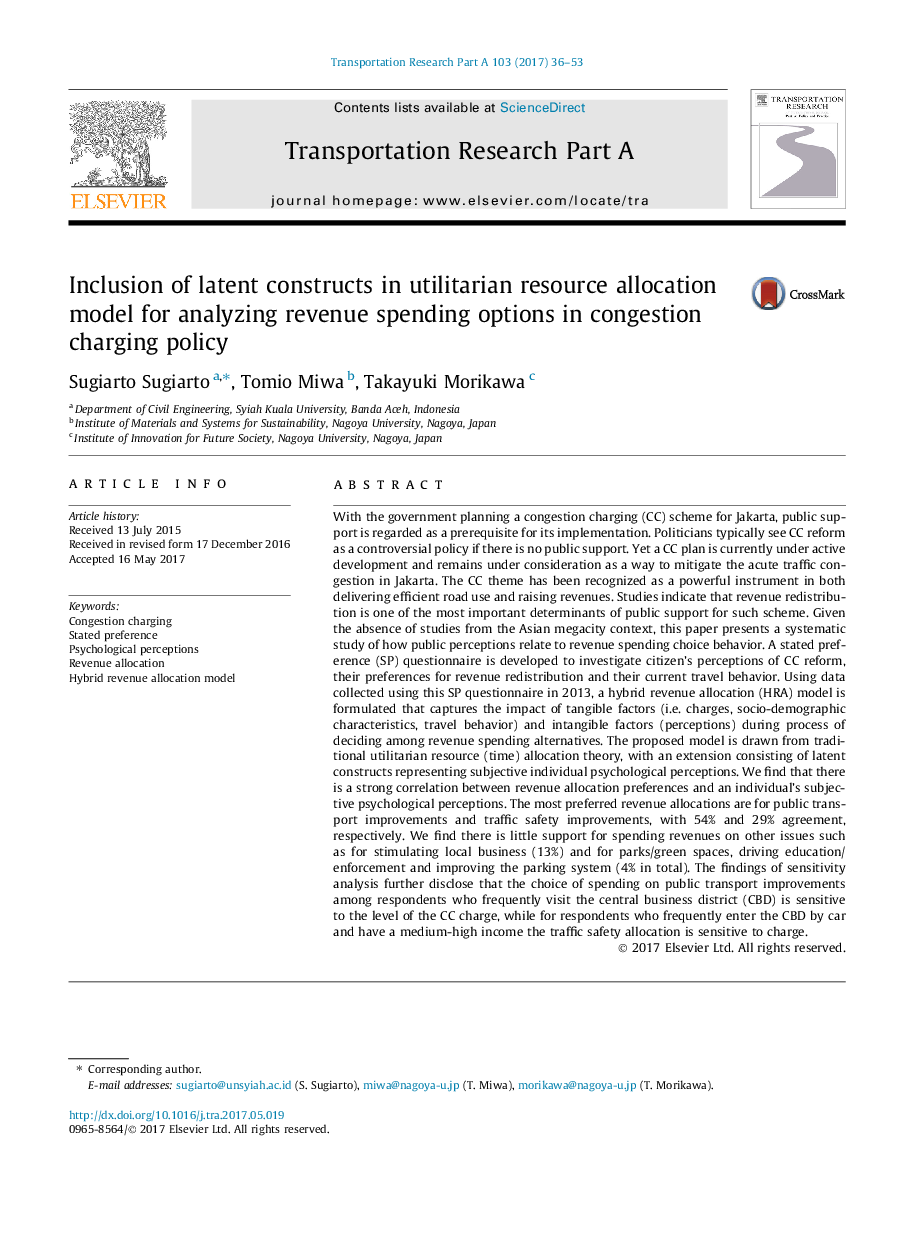| کد مقاله | کد نشریه | سال انتشار | مقاله انگلیسی | نسخه تمام متن |
|---|---|---|---|---|
| 4928905 | 1432197 | 2017 | 18 صفحه PDF | دانلود رایگان |
عنوان انگلیسی مقاله ISI
Inclusion of latent constructs in utilitarian resource allocation model for analyzing revenue spending options in congestion charging policy
ترجمه فارسی عنوان
استفاده از ساختارهای پنهان در مدل تخصیص منابع سودمند برای تحلیل گزینه های درآمد در سیاست های احتساب احتمالی
دانلود مقاله + سفارش ترجمه
دانلود مقاله ISI انگلیسی
رایگان برای ایرانیان
کلمات کلیدی
شارژ بارگیری ترجیح داده شده ادراکات روانشناختی، تخصیص درآمد، مدل توزیع درآمد ترکیبی،
موضوعات مرتبط
مهندسی و علوم پایه
سایر رشته های مهندسی
مهندسی عمران و سازه
چکیده انگلیسی
With the government planning a congestion charging (CC) scheme for Jakarta, public support is regarded as a prerequisite for its implementation. Politicians typically see CC reform as a controversial policy if there is no public support. Yet a CC plan is currently under active development and remains under consideration as a way to mitigate the acute traffic congestion in Jakarta. The CC theme has been recognized as a powerful instrument in both delivering efficient road use and raising revenues. Studies indicate that revenue redistribution is one of the most important determinants of public support for such scheme. Given the absence of studies from the Asian megacity context, this paper presents a systematic study of how public perceptions relate to revenue spending choice behavior. A stated preference (SP) questionnaire is developed to investigate citizen's perceptions of CC reform, their preferences for revenue redistribution and their current travel behavior. Using data collected using this SP questionnaire in 2013, a hybrid revenue allocation (HRA) model is formulated that captures the impact of tangible factors (i.e. charges, socio-demographic characteristics, travel behavior) and intangible factors (perceptions) during process of deciding among revenue spending alternatives. The proposed model is drawn from traditional utilitarian resource (time) allocation theory, with an extension consisting of latent constructs representing subjective individual psychological perceptions. We find that there is a strong correlation between revenue allocation preferences and an individual's subjective psychological perceptions. The most preferred revenue allocations are for public transport improvements and traffic safety improvements, with 54% and 29% agreement, respectively. We find there is little support for spending revenues on other issues such as for stimulating local business (13%) and for parks/green spaces, driving education/enforcement and improving the parking system (4% in total). The findings of sensitivity analysis further disclose that the choice of spending on public transport improvements among respondents who frequently visit the central business district (CBD) is sensitive to the level of the CC charge, while for respondents who frequently enter the CBD by car and have a medium-high income the traffic safety allocation is sensitive to charge.
ناشر
Database: Elsevier - ScienceDirect (ساینس دایرکت)
Journal: Transportation Research Part A: Policy and Practice - Volume 103, September 2017, Pages 36-53
Journal: Transportation Research Part A: Policy and Practice - Volume 103, September 2017, Pages 36-53
نویسندگان
Sugiarto Sugiarto, Tomio Miwa, Takayuki Morikawa,
